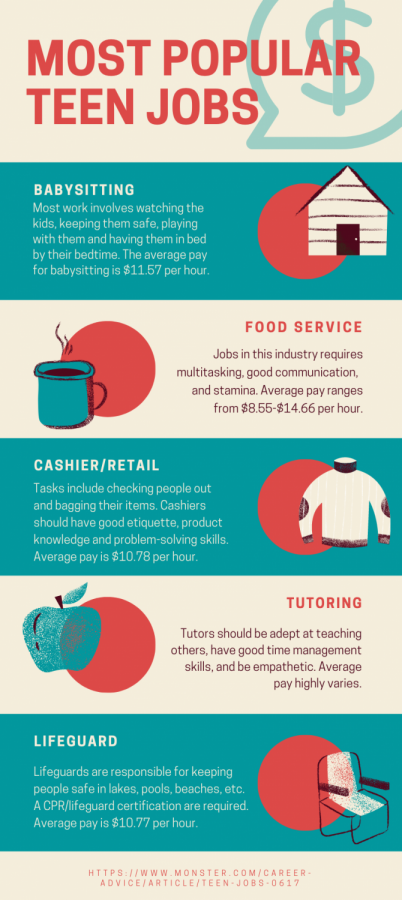3 tips on working at part-time job as high school student
Job opportunities for teens are diverse and can be found in multiple different industries. Source: Monster.com
June 24, 2021
While some may use summer vacation to sit back and relax, others keep themselves busy by getting a job, often continuing to work even when the school year starts up again.
“It’s a great way to pass the time because before I got a job, I would spend so much time on my phone doing absolutely nothing,” senior Tiffany Tran said. “Now, I’m forced to manage my time better and create an organized schedule so that no time goes to waste.”
In addition, earning money can also help one learn critical financial skills. Practicing these skills starting from a young age is great for building experience and becoming more comfortable with managing personal finances.
“You learn how to become independent and how to pay for items yourself,” junior Neha Balaji said. “By working a job, I’m able to spend on myself and others, learn how to save and invest my savings.”
Tip #1: Search thoroughly
The job-search process can be quite nerve-wracking for those who have no clue where to start looking. Take advantage of online job search engines, which have hundreds of opportunities open to teens.
“Check out LinkedIn and Indeed,” Balaji said. “They’re so helpful when it comes to narrowing down a job targeted towards minors and those without higher-level degrees.”
The Balance Careers also recommends in-person networking as a way to narrow down job options and get a lead, suggesting reaching out to friends who are employed and trying to contact neighbors, teachers, counselors and coaches. For those interested in creating their own business, networking is a great strategy to use for self-employment.
“Maintain local connections,” Bajali said. “Being brave enough to post a single ad in your neighborhood’s [online] forum can help launch a new babysitting or pet-sitting side hustle.”
Tip #2: Prioritize flexibility
Having a job requires commitment, and it’s important to find a job that works well within one’s personal schedule. Apply to a business that offers flexible hours so shifts can be adjusted as needed.
“Don’t overwork yourself to the point that you can’t do anything besides work because that will be damaging academically and mentally,” Tran said. “Also, don’t be afraid to deny a job offer because there will always be more jobs that better fit your schedule.”
As high school students, many already have a full plate of responsibilities such as clubs, sports and volunteering to balance along with schoolwork. Employees should try to plan shifts ahead of time and communicate with their manager when their calendar might be more full than usual.
“Understand how to balance work and school,” Bajali said. “You need to make sure that neither becomes too burdening. School is more important to me, so during times where I’m extremely busy, I limit my time at work just to ensure I’m prepared to focus and study for school.”
Tip #3: Be straight-forward
It might take a while to get the hang of working for the newly-employed, especially when coming in with zero experience. Remember, nobody is perfect—especially when trying something for the first time. Avoid getting too worked up about making a mistake during the first few shifts on the job and don’t be afraid to ask for help from more experienced co-workers.
Some employers pressure their employees into staying past scheduled hours or taking up more shifts than originally planned. In this case, workers need to know how to set boundaries with their manager and clearly communicate if there’s a problem.
“Being able to share your struggles is crucial [while] working a job because change will not occur if you don’t seek help,” Tran said. “Be clear on what you want because you will struggle if you are too lenient or constantly overwork yourself.”
Having a job can be quite difficult at times; for example, working in the food service industry requires one to be on their feet for long periods of time and rude customers are not uncommon.
Despite the challenges that might arise in a workplace, many find that the benefits of a part-time job are appealing enough to continue working even after summer vacation. According to Walden University, about 30% of high school students are employed and work for at least a portion of the school year.
“Although money is definitely an amazing reward, the friendships I’ve made and the new ability to work with people while under pressure are more valuable,” Tran said. “I believe that I’ve improved a lot as a person after getting a job because I now know what hard work truly is.”





